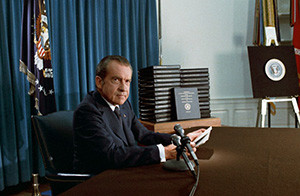
Can the president quit his day job?
It's a question worth asking right now considering just a few months ago, GOP President-elect Donald Trump said he'd consider doing as much if elected.
Trump, "smiling mischievously," according to The New York Times on July 7, responded to reporter questions by saying, "I'll let you know how I feel about it after it happens."
As a matter of law, a U.S. president can in fact quit his office if he so chooses...
Can the President Quit His Job? Yes
While it's unlikely that Trump, or any president for that matter, would quit his job -- he can.
The U.S. Constitution stipulates no reasons why he couldn't.
The 25th Amendment deals with the specific procedures following a president's resignation. However, the amendment does not stipulate particular grounds for resignation.
Don't Miss: How Small Investors Can Take on Wall Street... and Win
In fact, Donald Trump could step aside right now and "quit the presidency" before he's even sworn into office.
Here's what would happen if Trump did just that...
[mmpazkzone name="in-story" network="9794" site="307044" id="137008" type="4"]
The 45th President of the United States: Mike Pence
We have a constitutional amendment for this one, too - the 20th Amendment.
Here's our new, free service to help you make more money.
It states: "If a President shall not have been chosen before the time fixed for the beginning of his term, or if the President elect shall have failed to qualify, then the Vice President elect shall act as President until a President shall have qualified."
In that case, Trump could effectively "deem himself unqualified" and "choose" Pence to take over after voters have elected him to office (which they have).
Now, the most likely scenario -- and one with historic precedent -- that'd prompt a presidential resignation is the threat of impeachment.
Can the President Quit Before He's Impeached?
The short answer: Absolutely.
Quick reminder: Impeachment is a political process that involves the recommendation of removing an active politician from office. It's up to Congress to make this recommendation and to determine whether the politician committed any impeachable offenses while in office.
That last part is important - because a politician cannot be impeached from his or her position for violations that occurred before or after taking office. That's why it would have been impossible to impeach Democratic presidential candidate Hillary Clinton over her use of a private email server should she have won the 2016 presidential election. The alleged offenses she'd committed had occurred while she was secretary of state - not while in the White House.
The same goes for Donald Trump - he could not be impeached once he resumes office for an offense allegedly committed before becoming president.
However, he could, after some time, be impeached for purportedly committing an offense while in office. And if that were the case, he could also then willingly resign.
This has been done by one president in the past...
When "Tricky Dick" Nixon Said "I'm Out"
Former President Richard Nixon resigned from office of his own volition on Aug. 9, 1974. He’d been linked to the Watergate scandal that involved two prowlers breaking into the DNC’s headquarters two years prior in an attempt to wiretap their phones.

Impeachment was on the table for Nixon. By resigning, "Slick Rick" avoided an official congressional trial.
Vice President Gerald Ford immediately assumed the presidency (side note: Ford actually became vice president after Nixon's original VP, Spiro Agnew, resigned on Oct. 10, 1973, for tax evasion).
BRILLIANT: Average Americans Are Becoming Marijuana Millionaires. Read More...
On Sept. 16, 1974, just a bit more than a month after stepping up, Ford granted Nixon a blanket pardon on all possible offenses committed by Nixon. This allowed Nixon to avoid any future criminal trials linked to the Watergate affair.
Ultimately, Nixon's resignation occurred as a last resort. He would have almost certainly been impeached by Congress had he remained in office.
Up Next: We know that Donald Trump received billions worth of free media coverage during the election. But here's a further breakdown of Trump's free-media strategy...
Follow us at @moneymorning or on Facebook.
Related Articles:
- The New York Times: Would Donald Trump Quit If He Wins the Election? He Doesn't Rule It Out
- Money Morning: The 3 Ways Trump Can End Obamacare
- Money Morning: Final Sum: Clinton Outspent Trump Over 2:1
- Money Morning: Will Donald Trump Cut Social Security Benefits?


